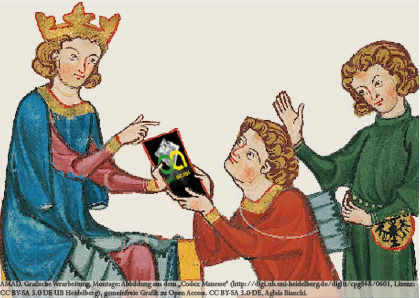AMAD
„Archivum Medii Aevi Digitale - Interdisziplinäres Open-Access-Fachrepositorium und Wissenschaftsblog für Mittelalterforschung‟Zur Einreichung

| Datum: | 2017 |
| Titel: | Pavia’s Twin: Power and Identity in Early Medieval Benevento (570-899 CE) |
| Mitwirkende: | Jansen, Katherine (Committee member) Rousseau, Philip (Committee member) Waldman, Martin (Creator) The Catholic University of America (Degree granting institution) Davis, Jennifer (Thesis advisor) |
| Beschreibung: | This dissertation surveys the development of the Duchy/Princpality of Benevento from its founding in 570 to its takeover by the Lombard counts of Capua in 899, focusing specifically on its Lombard inhabitants’ conceptions of their own identity and how these evolved in response to significant political events, most notably, the Frankish conquest of the Lombard Kingdom in the north in 774. It will argue that Benevento’s continued independence after 774 contributed to and rested, in part, on the development of a more clearly defined and politicized sense of Lombard identity, one which was deeply rooted in a strong degree of antipathy towards other groups and the belief that to be Lombard was to be, above all else, free and independent. Such perceptions were a product of efforts by members of the southern Lombard elite to maintain both their political power and the cultural distinctions between themselves and other groups. The Beneventan dukes, in particular, would undertake a number of important actions, such as assuming the title of princeps gentis Langobardorum, intended to elevate their own status within the gens and to leverage their people’s shared sense of identity as a force for greater political cohesion. These actions would help to foster a political and cultural climate which not only enabled the southern Lombards to maintain their own existing political and cultural practices, but also encouraged them to explore and more clearly define their traditions, values, history, and, ultimately, their sense of identity. Consequently, ethnicity would come to be increasingly emphasized in political and cultural discourse during the ninth and tenth centuries, with Lombard princes and authors frequently expressing their sense of pride in Lombard achievements (especially military victories), their antipathy towards other groups, and the belief that Benevento, its rulers, and its people were the inheritors of the Lombard Kingdom’s legacy. Such sentiments not only sometimes encouraged the southern Lombards to set aside their internal differences in order to resist outside attacks on their independence, but, more broadly, created a strong link between the southern Lombards’ ethnic and political identities. ; History ; Medieval history ; European history ; Benevento, Early Medieval, Ethnicity, Lombards, Political Power, Southern Italy ; History ; Degree Awarded: Ph.D. History. The Catholic University of America |
| URI: | https://www.amad.org/jspui/handle/123456789/73622 |
| Quelle: | http://hdl.handle.net/1961/cuislandora:64714 http://cuislandora.wrlc.org/islandora/object/cuislandora%3A64714/datastream/TN/view/Pavia%E2%80%99s%20Twin%3A%20Power%20and%20Identity%20in%20Early%20Medieval%20Benevento%20%28570-899%20CE%29.jpg |
| AMAD ID: | 567893 |
| Enthalten in den Sammlungen: | BASE (Bielefeld Academic Search Engine) General history of Europe |

